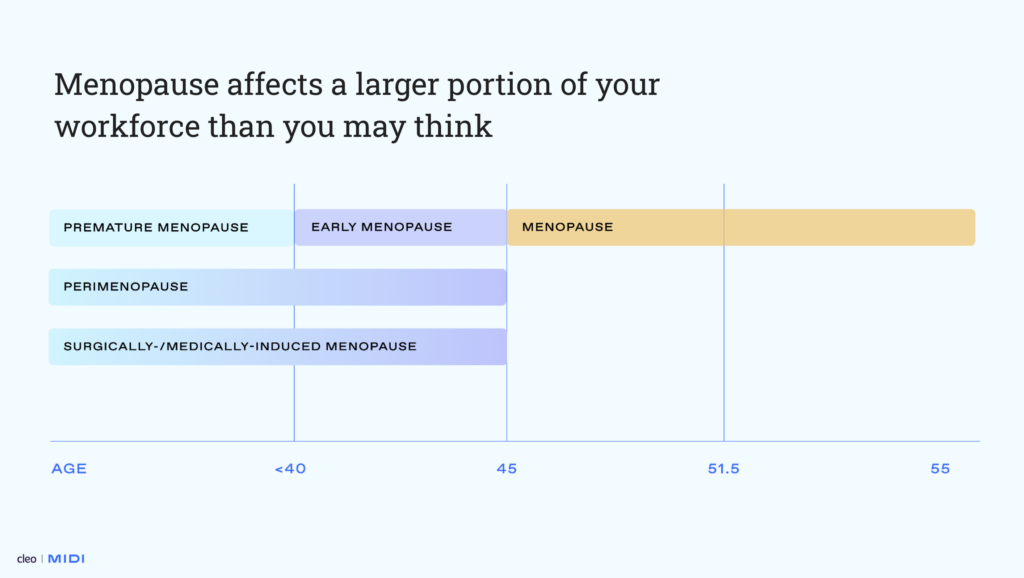Have you been wondering if adding menopause support as a benefit is right for your organization?
Cleo recently co-hosted a webinar with Midi Health on the strategic advance of offering menopause support as a benefit. Experts from both Cleo and Midi weighed in on what exactly happens during menopause, how it affects employees, and how it affects employers’ bottom lines.
Why are we talking about menopause at work?
Menopause is already affecting your workplace, and it’s impacting more of your population than you may know.
Menopause, which is officially defined as 12 months from one’s last menstrual period, is a physiological process that can affect up to three generations of women at a time. It is often accompanied by a wide variety of debilitating symptoms, such as insomnia, memory problems, mood changes, anxiety, and depression — which, of course, affect how well employees can perform their jobs. 99% of menopausal women felt that symptoms had negatively impacted their careers.

Menopause affects top talent, in particular. 42% of managers are women, and 62% of women in management are over age 40.
Because of the wide array of seemingly-disparate symptoms, and the fact that the majority of OB/GYN physicians are not trained nor equipped to support women experiencing menopause, most women in the workplace are left to their own devices to figure out how to mitigate their symptoms. Many resort to “polyshopping” — visiting upwards of 5 different types of specialists to treat what is actually perimenopause or menopause. This results in an outsized healthcare spend for employers. On average, $8,000 per employee is lost due to low productivity as the employee is left to fend for themselves.
There’s a better way to support employees going through menopause.
Menopause symptoms for employees should be treated in the same way that all stressors and workplace detractors for employees should be treated: By considering the whole person, and everything going on in their lives and by ensuring that appropriate medical care is given.
Here’s an example of how this works with Cleo + Midi as employee benefits:
An employee named Josie recognizes that she hasn’t been sleeping well — but with everything going on in her life, it could be any number of things. She’s leading a team at work, she’s taking care of two teenagers, and her father was recently diagnosed with Alzheimer’s disease, so she’s caring for him, too.
In a chat with her Cleo Guide, Josie talks more about how she’s suddenly felt a few waves of anxiety and experienced something similar to a panic attack, though she’s never had those before. Her Cleo Guide recognizes that she needs support on multiple fronts: For her parenting and caregiving needs, as well as to potentially explore whether or not some of her sleep and anxiety symptoms are related to menopause.
Her Cleo Guide refers her to Midi. Her expert Midi clinician is able to holistically access all of her symptoms, diagnose perimenopause, and recommend a personalized treatment of FDA-approved hormone therapy and supplements.
Josie’s symptoms disappear almost immediately; she begins sleeping again and she continues to work with her Cleo Guide to help do some planning for her father, as well as discussing a few discrete issues that have come up with her children.
By providing Josie with these benefits, her employer hardly recognizes any change in Josie’s productivity for herself or her team, and they rest assured knowing that the benefits they have in place are there for when their employees need them.
The employer has saved a number of costs, including potential absences, team morale issues, unnecessarily and unhelpful medical costs, and potentially the outright attrition of a fantastic employee.

Learn more about Midi and some answers to top questions, and explore Cleo’s menopause support in addition to our parenting and caregiving support.
